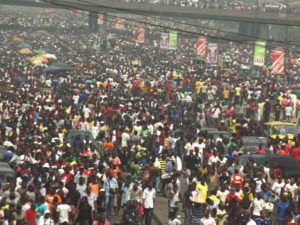
FOR some time now, there has been palpable worry in official circles over Nigeria’s rising population figures. For instance, last week, Vice President Yemi Osinbajo and the Minister of Finance, Hajia Zainab Ahmed, speaking at the 24th Nigerian Economic Summit in Abuja, expressed concern about the country’s population. According to Osinbajo, the government is working to reduce the country’s population by half through education. Ahmed, on her part, also hinted at the Federal Government’s plan, using its Economic Recovery and Growth Plan (ERGP), to align the population growth rate to economic growth and eventually exit the country from its current poverty trap. Considering the country’s rising population figures, the government’s qualm is understandable. Based on the latest United Nations estimates (as of yesterday), the country’s current population is 197,457,502. With a population equivalent to 2.57 per cent of the total world population, Nigeria ranks seventh in the list of countries and dependencies by population.
Indeed, in April this year, the National Population Commission (NPC) put Nigeria’s population at 198 million people. According to the NPC Chairman, Mr. Eze Duruiheoma, “Nigeria remains the most populous in Africa, the seventh globally with an estimated population of over 198 million. The recent World Population Prospects predicts that by 2050, Nigeria will become the third most populated country in the world. Over the last 50 years, the urban population has grown at an average annual rate of more than 6.5 per cent without commensurate increase in social amenities and infrastructure.”
No doubt, unbridled population growth exerts pressure on existing infrastructure and causes a plethora of social problems, including food shortage, poor quality of life and increased criminality. At the individual level, when couples give birth without adequate planning, they expose their families to financial pressures if not outright poverty, as well as medical challenges. At the national level, ‘overpopulation’ will no doubt put undue pressure on social facilities and infrastructure. Nigeria being, according to the Brookings Institution, the poverty capital of the world, the least the government can do is to ensure that the appalling conditions in which the majority of the populace are trapped do not degenerate any further. However, apart from the fact that population figures are often politicised while the multiplication of statistics gathering agencies have not helped, Nigeria has a unique history of wanting to plan population growth while ignoring the fundamentals of life and governance in a modern state. The question is, has Nigeria or, to be more specific, the political elite, agreed on the need for a state and on which basis? We do not think that there has been any effort as yet to answer this question, which is why, for the most part, politics and governance remain amorphous, anomalous and bogus.
NESG laments depressing economic realities
That Nigeria is abundantly blessed but criminally managed is an understatement. As Nigeria’s population increases, so do the thieves and vagabonds in power who make life hellish for the people. Surely, a government that mouths birth control while blatantly refusing to address economic problems cannot be taken seriously. It is a fact that the earning power of Nigerians has been seriously compromised without any glimmer of hope on the horizon. In any case, in spite of their shifting advocacy for family planning, Nigerian leaders, matching the stupendous though deviously obtained resources at their disposal with very large families, have not led by example. Then there is the question of juxtaposing population figures with the available resources. Are the available resources, barring poor leadership, enough to support the population or not?
Besides, it is important to realise that population strength is now generally seen as an asset rather than a liability, and the key issue therefore hinges on the management of resources. Were ‘overpopulation’ the problem, China and India would not be prospering. However, as far as the fundamentals of state are concerned, it would be quite insulting to mention China and Nigeria in the same breath. For instance, while China recently unveiled its type D bullet train which runs at 350km/h, the Nigerian government was, only last week, justifying the 90km/h movement of the Abuja/Kaduna locomotives on the excuse that it needed to protect the cows impeding their right of way. How can a government which cannot even manage cattle manage people?
It is true, as the NPC recognises, that the category of Nigeria’s population mostly engaged in urbanisation and migration are young people, and that the existing urbanisation trend coupled with internally displaced persons (IDPs) in cities poses critical challenges to securing the cities’ sustenance, including efforts to make them smart and responsive to human influx. But what has the government done about widespread poverty? According to the National Bureau of Statistics’ (NBS) 2017 report, under-employment and unemployment are growing at an average of 18.4 per cent. It is doubtful that a leadership responsible for such level of misery can preach birth control with an appreciable degree of success. In our view, Nigeria needs to embrace the restructuring imperative, which would, at least for a start, allow the regions to plan their economies, manage their populations and create prosperity.
END

Be the first to comment